Manipur’s social fabric torn to shreds as militant groups join the clash between Meiteis and Kukis
Smruti Deshpande
On June 29, fresh tensions gripped Imphal as thousands of people took to the streets to decry the tragic deaths of two individuals at Haraothel village at the border of Kangpokpi district. As per a report by the India Today, the lifeless body of one of the deceased was brought to Khwairamband women’s market in Imphal, attracting a large gathering of mourners from various parts of the state capital. The killings happened when armed miscreants opened fire at Haraothel village. Tangnaum and L Munlai villages under the Kangpokpi district were also attacked. Security forces are reported to have responded to the firing with additional columns being brought in.
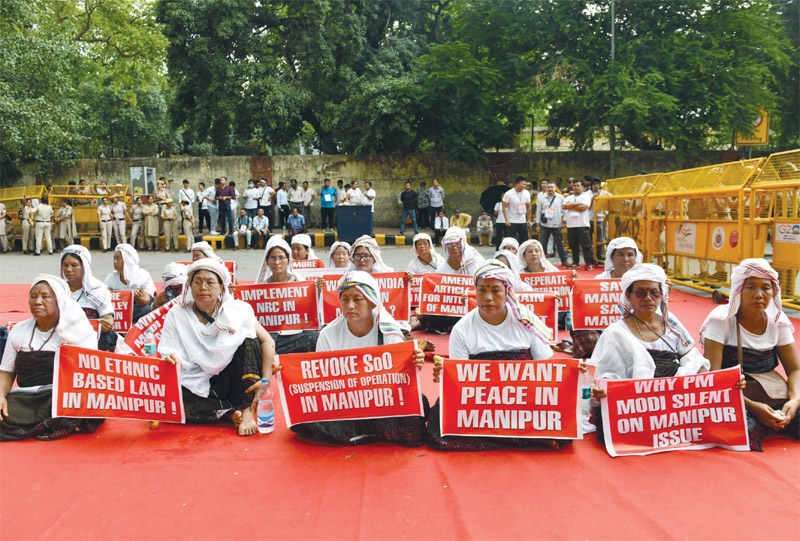
Manipur is experiencing large-scale violence with two of its communities—the tribal Kukis and non-tribal ethnic majority Meiteis—clashing over economic, social and political benefits, and quotas given to the tribes. The Meitei community has been demanding Scheduled Tribe (ST) status. The conflict, which began on May 3, has completed two months.
As the incident unfolded, women led the charge in expressing their contempt for the Biren Singh-led government for not containing the violence. As per the report, the women even questioned the Prime Minister’s silence on the matter. “The Manipur government has failed its people. We will not be silent spectators any longer. We are ready to take action, with or without Biren,” a woman protester was quoted as telling India Today. The Rapid Action Force (RAF) was deployed at the scene. As talks failed between the protesters and the security forces, a confrontational situation arose and to quell the protest teargas shells were fired.
On the same day Rahul Gandhi, the first Opposition political leader to visit Manipur, reached the state on a two-day visit. His itinerary included visiting relief camps and meeting with families affected by the weeks-long violence in the state. The day he reached, his convoy was stopped by the police in the Bishnupur area while heading towards Churachandpur, where the clashes began. He then had to take a helicopter to Churachandpur. A day later, Gandhi met ‘like-minded’ party leaders, the United Naga Council (UNC) leaders, and members of civil society organisations in Imphal. He also visited relief camps in Moirang.
As per a statement issued by the chief minister’s office (CMO) in early June, a total of 37,450 people were in 272 relief camps. This number is said to have gone up to 60,000. At least 98 people have lost their lives and 310 others have been injured in the ethnic violence. With the conflict not showing signs of dying down despite interventions, these numbers too would have gone up.
Reports say that as the state government staff is on leave because of the violence, CM Biren Singh recently ordered a ‘no work, no pay’ rule. The decision came after he chaired a cabinet meeting on June 12. A circular issued by General Administration Department (GAD) secretary Michael Achom said, ‘…all employees drawing their salaries from the General Administration Department, Manipur Secretariat, are informed that no work, no pay may be invoked to all those employees who do not attend their official duty without authorised leave.’
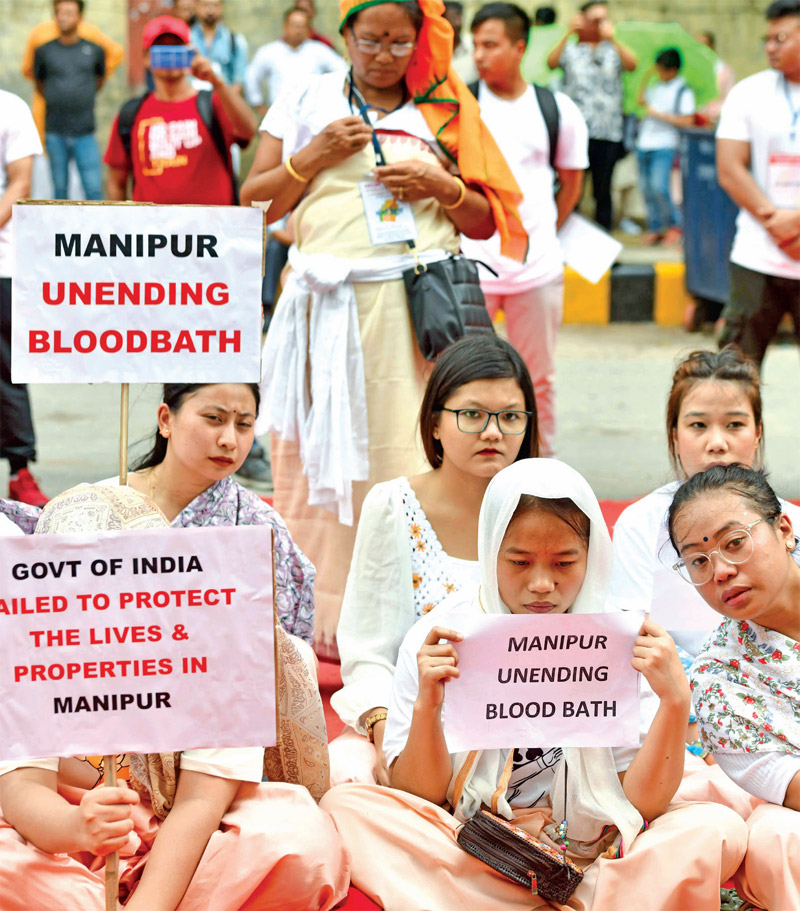
Union home minister Amit Shah visited Manipur on May 29 for three days to take stock of the situation. During the visit, Shah met Kuki civil society groups and tribal leaders in Churachandpur and Meitei groups in Imphal. After the visit, Shah announced a committee led by a retired high court judge to investigate the violence in Manipur.
A few days earlier, Biren Singh had met Shah in Delhi to brief him about the ethnic clashes. The CM reportedly said the situation in the state was ‘very chaotic’ and that he was not sure what was happening. The ethnic violence has attracted a heavy deployment of security forces in the northeastern state.
Following the meeting, the chief minister told the media in Imphal that Shah was concerned about the ‘changing nature’ of the violence. He said the Union home minister raised issues such as the attacks on the house of union minister of state for external affairs R.K. Ranjan Singh and the residence of state minister Susindro Meitei, the ongoing arson and destruction of government properties and the hampering of the movement of security forces.
Security forces too have been attacked in ongoing violence. As per a Press Trust of India report, the CRPF on May 6 directed its personnel hailing from Manipur and on leave in their home state to ‘immediately’ report to their nearest security base with family members after a CoBRA commando was killed in the ongoing violence in the state. The commando of the Central Reserve Police Force’s CoBRA unit was on leave. He was shot dead by armed assailants at his village in Churachandpur district.
Opposition parties have questioned the Prime Minister’s silence on the conflict. The Congress party said the PM’s silence was ‘rubbing salt into the wounds of the Manipur people.’ Congress president and Rajya Sabha MP Mallikarjun Kharge took to Twitter to criticise the government over its handling of the situation. He wrote, ‘3rd May 2023—Violence first broke out in Manipur. It took almost a month for you to send the Union Home Minister to the state. 8 days after Home Minister’s departure, violence continues in Manipur. For a proponent of the so-called ‘Act East’ policy for Northeast India, your stoic silence on violence in Manipur is rubbing salt in the wounds of its people. As the Prime Minister, the least you could have done is appeal for peace. You have betrayed Manipur!”
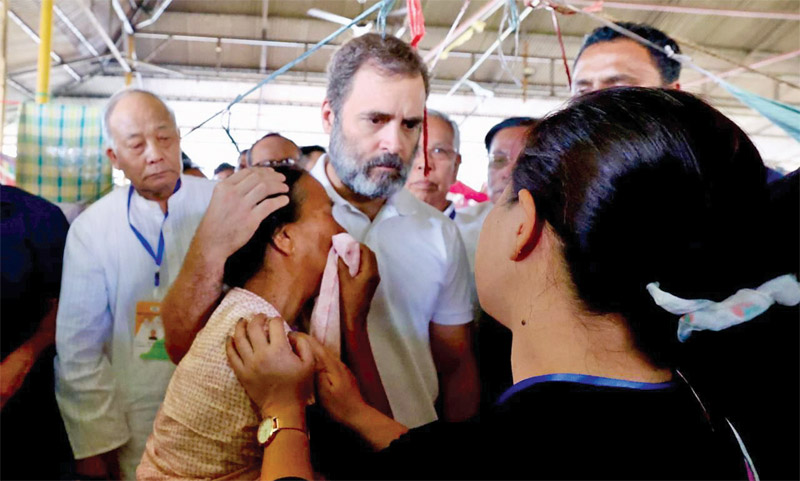
Recently, the army posted a video where it mentioned several incidents of women-led groups blocking its operations. The Hindu reported that the force also said that women activists in Manipur were accompanying armed rioters, deliberately blocking routes and interfering in the operations of security forces. The army stated on Twitter, ‘Women activists in #Manipur are deliberately blocking routes and interfering in Operations of Security Forces. Such unwarranted interference is detrimental to the timely response by Security Forces during critical situations to save lives and property.’ It added, ‘Indian Army appeals to all sections of population to support our endeavours in restoring peace. Help us to Help Manipur.’
Further, on June 26, the Indian Army released 12 cadres of the banned insurgent group Kanglei Yawol Kanna Lup (KYKL), who were apprehended in a village in the Imphal East district of Manipur, after a stand-off with a women-led mob of local residents. The KYKL is a Meitei insurgent group and is listed as a banned terrorist organisation by the National Investigation Agency (NIA). As per reports, ‘the 12 cadres were apprehended with arms, ammunition and war-like stores during an operation in Itham village on specific intelligence.’ The operation was obstructed by a mob of 1,200 to 1,500 people led by women and a local leader, which ‘immediately surrounded the target area.’
As the rift widened between the two communities, hundreds of people from Meitei organisations in Delhi ‘held a demonstration stressing that youth belonging to their community in the State should not be disarmed until and unless the government cancelled the Suspension of Operations (SoO) pact signed with Kuki insurgent groups in 2008,’ as per The Hindu. The SoO pact was a tripartite agreement between the state government, Centre and the Kuki groups. The state government had, however, withdrawn from the pact earlier this year. The Meitei groups also demanded that the process for drawing up the NRC had become ‘imperative more than ever.’
Sporadic clashes have been taking place almost every day. On June 9 it was reported that at least three persons were killed and two were injured in fresh violence after armed miscreants attacked Khoken, a Kuki village situated on the boundary of the Kangpokpi and Imphal West districts. This came a day after security advisor to the state government, Kuldiep Singh, had said that there had been no violence in the state in the preceding 48 hours.
Earlier, a day ahead of Shah’s visit, fresh clashes erupted in the state after the Indian Army commenced combing operations to disarm the communities. These clashes resulted into two deaths, including that of a policeman in separate instances of firing. Ahead of this incident, Biren Singh had announced the killing of 40 Kuki militants by the security forces, who, according to him, were targeting civilians. The disarming exercises were being done in order to recover looted weapons from police premises during the violence in May. Guards on duty at the Manipur Police Training Centre at Pangei in Imphal were reported to have fired blank bullets but they were outnumbered by mobs carrying stones, sticks and metal cutters.
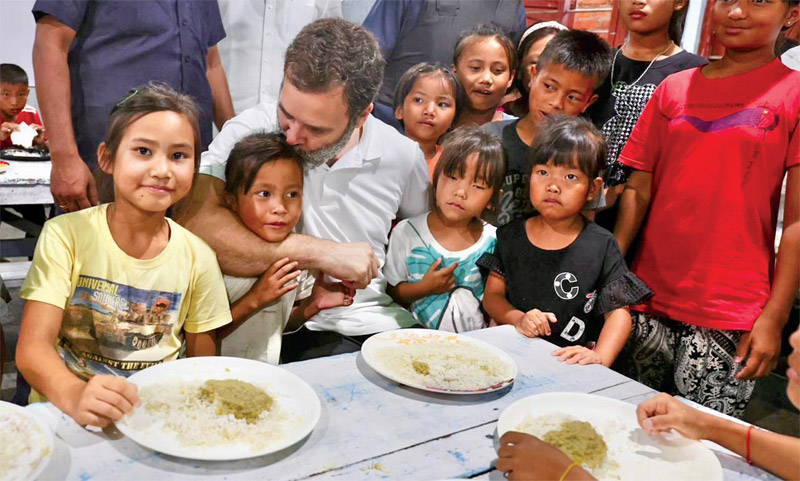
As per East Mojo, ‘On the third day of his visit to violence-hit Manipur, Union home minister Amit Shah visited the border town of Moreh and met the leaders of joint civil society organisations of Moreh and Tengnoupal to restore normalcy and peace in the state.’ Civil society organisations (CSO) present at the meeting reiterated their demand for a separate administration. They submitted a memorandum with an eight-point charter of demands to Shah.
The eight points include ‘separate administration for tribals/ Kuki, immediate withdrawal of Manipur Police Commando from Moreh, declare Meitei radical groups Arambai Tenggol and Meitei Leepun as outlawed organisations, stop court hearings related to the present conflict in Imphal, arrange chopper service between Moreh to Aizawl and Guwahati, ensure uninterrupted telecom services in Moreh, arrange transportation for safe supply of essential of goods and extend relief items directly from the Centre to Moreh.’ During the meeting Shah assured the withdrawal of the police commandos from Moreh.
At the beginning of the conflict in early May, 55 army columns were deployed in the violence-hit state along with troops from the Assam Rifles and the RAF. As reported later in the month, an additional 600 CRPF jawans from five companies were sent to Manipur on May 2023. Another 1,800 CRPF and Assam Rifles personnel were deployed in the state at the same time. A report by Hindustan Times stated that the latter deployment was in addition to 10,000 army and Assam Rifles personnel and 7,000 from the CRPF and the BSF already in the state.
The forces launched massive combing operations in sensitive flashpoints to track down armed insurgents. Search operations have also been launched in areas of Kangchuk, Motbung, Saikul, Pukhao and Sagolmang in Manipur to track down armed insurgents operating in these areas.
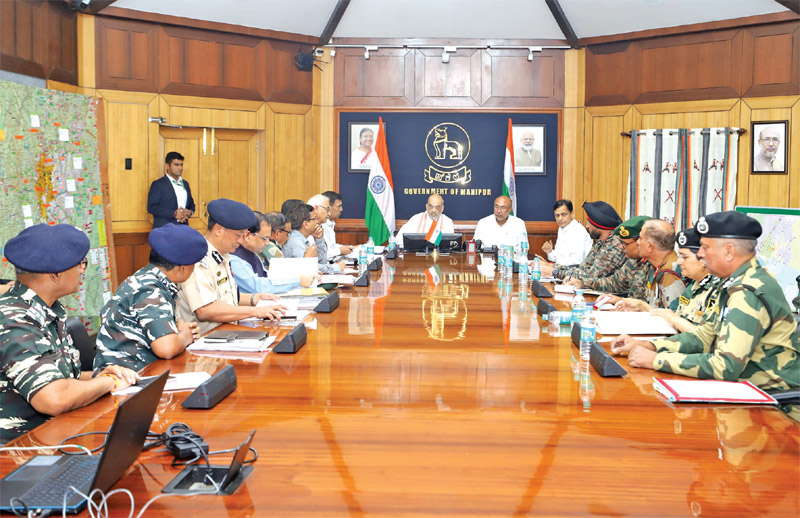
By the end of the second month of the violence, 12 bunkers were destroyed in Manipur and six mortar shells seized during search operations by security forces, as per the police. The bunkers were destroyed in 24 hours during search operations in Tamenglong, Imphal East, Bishnupur, Kangpokpi, Kakching and Churachandpur districts.
In June, accusations were rife about police commandos in consonance with militants fuelling Kuki-Meitei violence. Kuki villagers claimed police commandos were leading attacks with Meitei armed group. The Meiteis have, however, denied these claims. The Print in one of its reports from Manipur stated, ‘Across the district, Kuki men fighting on the front had the same narrative to share—that Manipur Commandos are leading the fight for Meiteis, followed by men in black clothes, who, they believe, are members of the Arambai Tenggol, a Meitei armed group.’ Kuki organisations in Churachandpur were attempting to collect evidence in the form of photos and videos, the report stated. Having accessed these videos, the report stated that The Print managed to view some of the footage but couldn’t independently verify it. ‘So far, though the videos show the presence of commandos at the site of burning villages, they are not shooting or torching houses.’
The conflict, which is raging like wildfire, has its origins in the state politics, where governments have been Meitei dominated. With the state’s complex social fabric, each community has its own separate demand. Kuki leaders in Manipur are demanding the establishment of a separate administration for the hill districts of Manipur, where most of the Kuki population resides. On the other hand, while Meiteis are a majority in the state amounting to 60 per cent of the population, they hold only 10 per cent of the total land area. The Nagas, another major community, have also opposed the Meitei community’s demand for ST status and have remained neutral on the matter of separate administration demanded by the Kukis.

